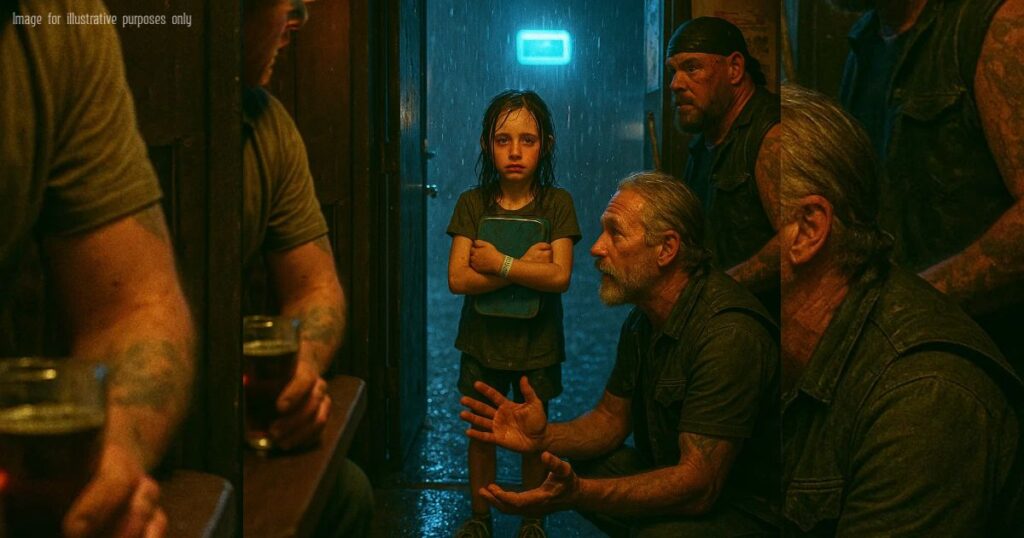Two weeks made a dent. Internal affairs opened an investigation.
Records came.
Phones were examined.
The local paper ran a story about a courthouse parade that changed the weather.
Three more attorneys called Maya to help.
Thirty-one kids moved from Sunrise Ridge to vetted homes around the county, like stars being set back in the sky one by one.
Rosa wrote June letters from treatment that smelled like peppermint tea.
She didn’t say sorry a thousand times. She wrote, “Thank you for asking for a summer. I’m going to make it count.”
Ghost learned the names of June’s stuffed animals even though she said she was too old for stuffed animals.
The River Saints switched out the lightbulbs in Rosa’s apartment.
Bear repaired a busted cabinet door that had a footprint on it. Splice installed a new doorbell cam and left a hand-drawn note: “This one remembers.”
On Saturdays, they took slow laps along the river, just June and Ghost at first, then sometimes the whole crew at a speed that honored patience.
Ghost didn’t try to be a father before the word fit.
He made dinner and bad jokes and space. June did homework at the bar because the bar was safer than some living rooms she’d seen.
A month passed.
Rosa stood up in group and said her name and said she wanted to be the kind of mother whose kid didn’t need to be braver than she was.
She said it to a circle of strangers who clapped like family because sometimes that’s what strangers become.
Ninety days came and went with the sound of a pen scratching signatures that were not erasures, but commitments. The review hearing felt less like a fight and more like breathing. Rosa’s counselor spoke. June spoke, more steadily this time. Ghost spoke least and best.
The judge didn’t make a speech.
She didn’t need to. “Continue guardianship with unsupervised visits progressing as recommended. Next review in sixty days. The court expects reunification if progress remains consistent.”
Outside, the River Saints didn’t roar. They smiled. That’s louder when you’ve earned it.
A year later, the bar had a new thing on the wall.
Between the framed photos of poker runs and charity rides and a retired helmet painted with flames, a dented blue lunchbox hung by two brass hooks. Below it, a small plaque read:
MARCH 7 — THE NIGHT A CHILD SHOWED US HOW TO STAND SLOW AND STRONG.
June likes to tap the lunchbox once when she walks by.
A superstition, maybe.
Or a blessing.
Rosa is there too on most nights, after work, sipping coffee, laughing the way people laugh when their lungs are new.
The River Saints still do the Slow Parade every spring.
Ten miles an hour.
No horns.
A circle around the courthouse to remind anyone who will listen that paperwork is powerful, but people are supposed to be more.
Deputy Price doesn’t work in the county anymore.
Investigations did what investigations do when truth refuses to move.
Sunrise Ridge found new leadership. Thirty-one names are on a bulletin board Maya keeps near her desk—kids who left a building for a living room.
June is taller.
She still draws stick figures with crowns.
Sometimes she draws sidecars full of sunflowers, as if the empty seats were always meant for something that grows.
People ask her, later, why she went to a biker bar. She shrugs. “My mom said they had wings. Maybe they just learned to hold them still.”
Ghost keeps a room ready even as reunification draws near, not because he doubts the future, but because he respects it.
Found family isn’t a replacement. It’s a bridge.
On the anniversary, June stands on a bench and speaks to a crowd that didn’t exist a year ago.
“I’m not a case number,” she says. “I’m a person. My mom’s a person. Thank you for helping us be people in a system that moves too fast.”
Engines answer the way engines do—low, steady, like a heartbeat you can hear with your whole body.
And if you walk into River Saints on a quiet Tuesday, you might catch Doc cleaning the glass over the lunchbox, careful and slow.
He’ll tell you what everyone there believes down to the bone: sometimes family is blood, sometimes it’s a promise, and sometimes it’s the people who ride in circles at ten miles an hour so a judge can hear a child ask for one honest summer.
Either way, when a kid walks in carrying more weight than any kid should, the rule here is simple.
You put your palms where they can see them.
You tell the truth until it stands up.
You stand between the child and the storm.
Thank you so much for reading this story!
I’d really love to hear your comments and thoughts about this story — your feedback is truly valuable and helps us a lot.
Please leave a comment and share this Facebook post to support the author. Every reaction and review makes a big difference!
This story is a work of fiction created for entertainment and inspirational purposes. While it may draw on real-world themes, all characters, names, and events are imagined. Any resemblance to actual people or situations is purely coincidenta


